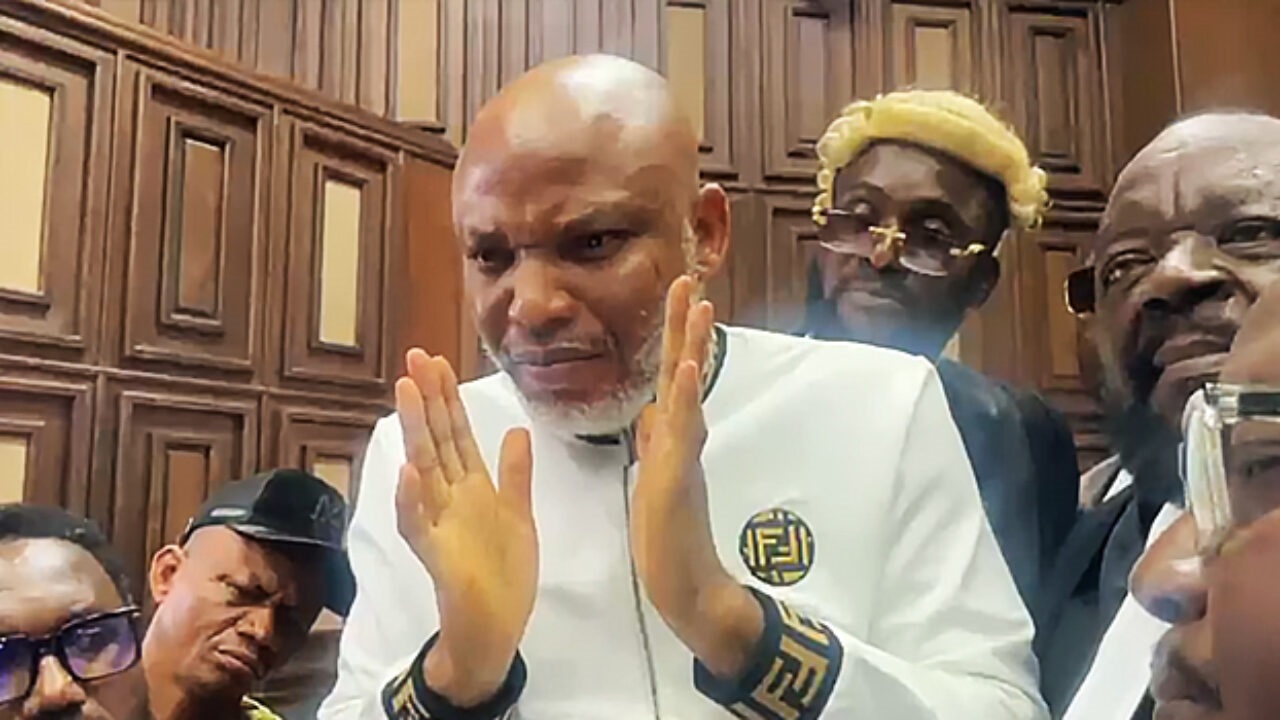A human rights lawyer, Barrister Chinomso Okezie, has dismissed claims linking the detained leader of the Indigenous People of Biafra (IPOB), Mazi Nnamdi Kanu, to terrorism, describing such assertions as false and inconsistent with the charges before the court.
Okezie, a member of the Mazi Nnamdi Kanu Global Defence Consortium, stated in a release on Sunday that contrary to widespread misinformation, the Federal Government has never charged Kanu with committing or participating in any terrorist act.
“The seven-count charge against Mazi Nnamdi Kanu contains no single count of committing or participating in any terrorist act under the Terrorism Prevention Amendment Act of 2013,” she said.
According to her, the charges only relate to alleged broadcasting and possession of communication equipment used for political expression, which, she argued, do not amount to terrorism under Nigerian or international law.
Okezie recalled that the Court of Appeal, in its judgment of October 13, 2022, had discharged Kanu and declared his trial a nullity, ruling that his extraordinary rendition from Kenya violated international law.
“The Court of Appeal, per Justice Jummai Hanatu Sankey, ruled that the entire process was unlawful and a breach of international conventions,” she noted. “That judgment remains valid because it has not been set aside.”
She explained that while the Supreme Court later held that the manner of rendition did not deprive the trial court of jurisdiction, it did not reverse the earlier discharge.
“The apex court merely remitted the matter for continuation of trial,” she clarified. “It did not nullify the finding that his extraordinary rendition was illegal.”
The lawyer also questioned the portrayal of Kanu as a violent agitator, insisting that no admissible evidence has been presented to support such a claim.
“If there were videos or weapons linking him to violence, the prosecution would have tendered them after nine years and five amended charges,” she said. “There is no single forensic video, no chain of custody, and no proof of any armed group he allegedly commanded.”
Okezie warned that national security must not be used to justify prolonged detention or disobedience of court orders.
“National security cannot legalize illegality. The Supreme Court in Marwa v. Nyako (2012) made it clear that the Constitution is supreme and any action inconsistent with it is void, no matter the motive,” she stated.
She maintained that Kanu’s activities fall within his constitutional rights, citing Section 39 of the 1999 Constitution, which guarantees freedom of expression, and Article 20 of the African Charter on Human and Peoples’ Rights, which recognizes the right to self-determination.
“Advocating for political reform or self-determination is not terrorism. It is protected speech,” she added.
Defending public campaigns calling for Kanu’s release, Okezie described them as legitimate demands for justice.
“Every major democratic turning point in history began with freeing a conscience prisoner,” she said. “Mandela’s release changed South Africa, Gandhi’s reshaped India, and Martin Luther King’s energized the civil rights movement. Justice for one political prisoner is justice for all.”
She faulted the use of controversial international detentions as justification for Kanu’s incarceration, saying such cases — including Guantánamo Bay, Turkey, and Kashmir — have been widely condemned by the international community.
“Those are not models of justice,” she said. “The United Nations and European courts have repeatedly condemned such practices as politically motivated detentions.”
Describing Kanu’s prolonged detention despite court orders as a threat to democracy and judicial independence, Okezie urged the Federal Government to comply with judicial rulings and release him.
“Obedience to court orders remains the cornerstone of democracy,” she said. “No government can claim to uphold the rule of law while selectively enforcing judgments.”
She concluded that Nigeria’s international credibility depends on its respect for the rule of law.
“The government must demonstrate that no citizen is above or beneath the protection of the Constitution,” Okezie said. “The continued detention of a man discharged by a competent court undermines the nation’s commitment to justice and equality. The law must remain sacred. Justice for one is justice for all.”





